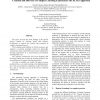Free Online Productivity Tools
i2Speak
i2Symbol
i2OCR
iTex2Img
iWeb2Print
iWeb2Shot
i2Type
iPdf2Split
iPdf2Merge
i2Bopomofo
i2Arabic
i2Style
i2Image
i2PDF
iLatex2Rtf
Sci2ools
94
Voted
CISIS
2009
IEEE
2009
IEEE
Creation and Delivery of Complex Learning Experiences: The ELeGI Approach
The paper presents the main findings of the ELeGI project, namely its learning model and software architecture to support the creation and execution of complex learning processes. The learning model defined in ELeGI promotes and supports a learning paradigm centred on knowledge construction using experiential based and collaborative learning approaches in a contextualised, personalised and ubiquitous way. The software architecture has been designed and developed taking into account the learning model for the personalisation of complex learning experiences. In order to validate our results, the paper presents and describes a case study relating to the implementation of a Unit of Learning for explanation of the Torricelli’s law, and its execution on top of the Service Oriented Architecture.
| Added | 21 Jul 2010 |
| Updated | 21 Jul 2010 |
| Type | Conference |
| Year | 2009 |
| Where | CISIS |
| Authors | Nicola Capuano, Angelo Gaeta, Agostino Marengo, Sergio Miranda, Francesco Orciuoli, Pierluigi Ritrovato |
Comments (0)

